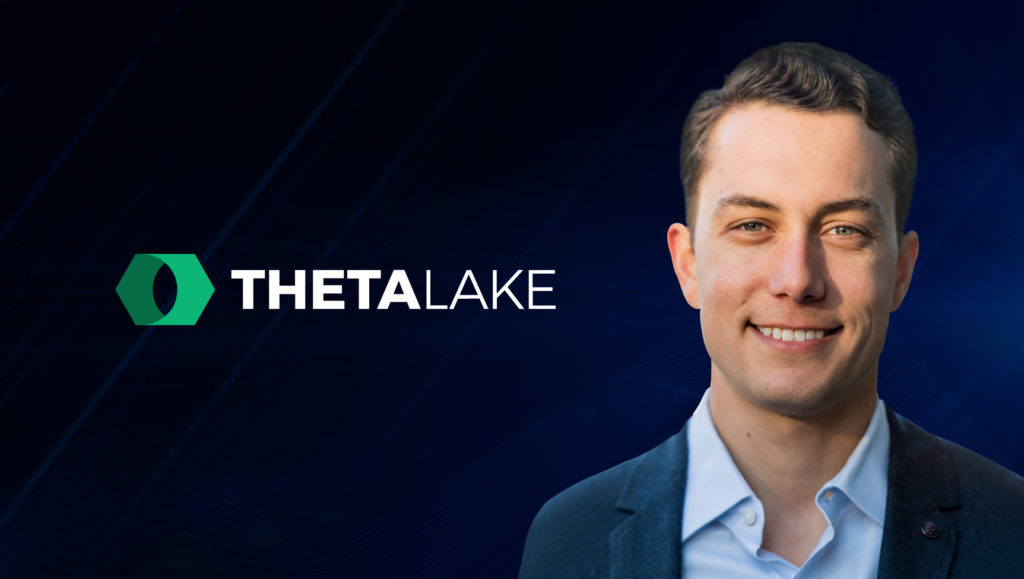Tell us about your journey to Business Development in the Audio-Video Communication industry.
My career started in Financial Services, Investment Banking. I continued applying that skill set when I moved over to Proofpoint, a cloud security vendor, as part of their Corporate Development team. I like to think we punched above our weight both as a company and as a 2-person Corporate Development team, executing 15+ deals over my 5-year term. The two of us sourced deals, negotiated agreements, conducted diligence, and integrated the companies.
Corporate Development is similar to Business Development in a lot of ways, takes a lot of effort prospecting and sourcing the right partners, evaluating strategic fit, negotiating the agreement, and making sure the partnership achieves the stated goals, which is how I ended up leading our Business Development and Operations efforts at Theta Lake. Circling back to industry focus, my experience within Financial Services, Compliance, and Security verticals has been helpful as we focus on serving highly regulated organizations as Financial Services is at the top of that list — so understanding their needs and requirements is much easier after being on the other side.
What inspired to join Theta Lake?
As I mentioned, at Proofpoint we acquired a number of companies. One of them was Nexgate, the leader in social media security and compliance. They became the cornerstone of Proofpoint’s Digital Risk platform. The founders, Devin Redmond and Rich Sutton, are the same founders of Theta Lake.
I had always been very impressed with Devin and Rich and their ability to identify an unsolved need in the market and execute on that vision by building a solution to address that need. Regulated organizations were slow to adopt social media tools due to the retention and supervision requirements and there were no solutions in the market to address those security and compliance needs, thus the genesis for Nexgate.
We are doing the same thing at Theta Lake. Financial Services and other regulated organizations are seeing how powerful video can be as a tool — 85% of people want to see more video from brands, 76% of organizations see an increase in sales from using video marketing. Thus, using video to engage with customers/prospects, creating sales and marketing videos to educate prospects, or using video for customer onboarding or insurance claims filing can all have a profound impact on a business through increased sales, higher customer satisfaction, and lower operating costs.
However, audio and video are subject to the same regulatory requirements of retention and supervision, but all of the compliance tools in the market have been built for text-based communication. Looking inside of audio and video content for regulatory, conduct, or corporate compliance risks on what was said or shown seemed like a very difficult and exciting problem to solve. Convincing me to join an incredible team, addressing a difficult, unsolved need in the market wasn’t too difficult.
Recommended: SalesTech Interview With Adam Mergist, Chief Sales Officer At Clearlink
How do you leverage channel sales for your AI technology?
We noticed a trend in the market where organizations are focused on becoming platforms, enabling an open ecosystem of applications to be built on top of their solution. This is great for customers — they no longer need to wait for a vendor to build new features/functionalities. Instead, they have access to a large database of partner applications that solve their niche business problems and already have a fully integrated solution. You can create a best-of-breed environment solving an organization’s unique business problems.
Compliance fits well into this discussion. Although our solution applies to all enterprises, high-regulated verticals such as Financial Services, Insurance, Healthcare, Pharma, and Education generate the most demand for our solutions. It would take a lot of time, effort, and expertise for one of our partners to create a video communication compliance suite as they already have a full product roadmap. Now they have compliance experts in Theta Lake building a fully integrated AI-based compliance tool that their customers have access to, a win-win situation.
Expanding on this even further, compliance teams can actually block adoption of video communication solutions because they don’t have the ability to effectively supervise and review digital content. Thus, the product integration with our partner’s solution allows them to sell into regulated verticals that they previously didn’t have access to, helping them scale their go to market.
These market dynamics have enabled us to be very successful in developing a robust channel strategy and partnerships with leaders in video conferencing, cloud communication, and marketing video creation and management systems. We are very proud to be partnering with Vidyard, Zoom, RingCentral, Microsoft, and will be announcing a few more in early 2019.
How did your role at Proofpoint prepare you to take on the current challenges in the Sales Technology industry?
Corporate Development is similar to Business Development in a lot of ways — the skills needed to make an acquisition successful mirror making a partnership successful. It takes a lot of effort prospecting and sourcing the right partners, evaluating strategic fit, negotiating the agreement, and even, more importantly, developing goals and objectives to execute against in order to make the partnership successful.
In M&A as in Business Development, I’ve found being selective is a more effective strategy than playing a number game. Not every acquisition or partnership is going to be successful, but if you get 1 or 2 really strategic partnerships that can be home runs it can fundamentally change the path of the business. We feel like each of the partnerships (Vidyard, RingCentral, Zoom, Microsoft) we have in place can turn into home runs, which is why we are so excited about the opportunity to be working with them.
Which geographies are you currently focusing on? Which of these geographies are more competitive in leveraging Audio-Video Communication tools for their sales practices?
We are focused on North America, UK, and Europe. What drives demand for our solutions are the new and existing regulations that look to provide additional protections for consumers. For example, protecting consumers from financial advisors making inappropriate or misleading statements, regardless of the communication channel, which creates large risks for financial firms.
The UK and Europe have been leaders in providing those protections with the introduction of MiFID II (financial market regulations), GDPR (privacy protections), although the US isn’t far behind with recent publications by FINRA and the SEC around electronic communication supervision and the use of regulatory technology tools.
Also Read: SalesTech Interview With Brian Howe, Alliances Director At Skynamo
Directly or indirectly, which sales leaders and companies have made the most profound impact on the way you work with technology for sales and revenue?
Any sales vendors embedding video into their solution has an impact on our solution. Initially, video content management systems were focused on marketing videos, professionally produced content that gets distributed through a website or advertising. Organizations such as Vidyard have changed the dynamic with the introduction of personalized sales videos, enabling people to create and distribute short-form, personalized video content. People have been consuming and engaging more with short-form content because of its authenticity and personalization, which is why we find the business application so interesting and relevant.
This is also why we think Vidyard’s partnership with HubSpot is so powerful, embedding video right into the CRM. We have also seen Zoom develop an integration with HubSpot to enable sales reps to prospect and engage with customers using video conferencing, developing a stronger personal connection earlier in the sales life cycle.
The other technologies that have had an impact on our GTM are Sales Automation, where we leverage HubSpot. With a small sales team, we need to automate as many of the early stages of the sales cycle as possible until a prospect becomes more engaged. This automation allows us to increase our outreach efforts, while ensuring we aren’t letting leads slip through the cracks.
How do you work with data science, process automation, enterprise planning, and advanced analytics at Theta Lake?
Theta Lake’s platform enables organizations to be more efficient and effective in their communication supervision process, performing better review on more audio and video media without dramatically increasing staffing, training, and oversight costs.
To accomplish this, we use data science and process automation not only by how we process the digital content (speech transcription, extracting scene content, optical character recognition, facial recognition), the detection policies we apply to the audio and visual content using Natural Language Processing and Deep Learning, but even how we surface risks within a workflow for compliance teams during content review. This automation enables organizations to not only have technology review 100% of their audio and video content but allows compliance teams to focus manual review efforts on higher risk content.
In order to process the content for compliance supervision, we generate a lot of rich analytics that can be used to generate reports or search across during eDiscovery. Some examples would be reporting on the most common type of compliance violations, building risk profiles on individuals, or demonstrating our ROI through surfacing performance metrics on compliance teams digital content review.
Recommended: Sales Call Analytics Is The Difference Between Winning And Losing Customers
How is selling AI technology different from doing business for a Cloud or a SaaS company?
Theta Lake is a SaaS-based solution, so we leverage our collective experience working at SaaS companies in regard to selling, pricing, financials, and overall business strategy. There are a couple of interesting attributes of selling AI that I will highlight. AI technology generates a lot of interest and buzz so organizations are always open to learning more, however, they are also very apprehensive about deploying a new AI solution as they most likely have been burned on a previous project that overpromised or they didn’t tightly define the use case and goals for the AI project and it didn’t meet expectations.
Thus, there is a lot of education that is needed at the beginning stages of the sales cycle around the limitations of AI and what it can accomplish since we are not replacing existing solutions, but developing a new, better way to solve a problem. The ways that AI is already being applied and the business problems it is solving are impressive and I think it is in the very early innings of its life cycle. What I also think is very powerful about AI, is the ability to not only solve a new business problem, provide better insights, but create significant cost savings by automating once repetitive, manual processes.
What are the major pain points for businesses in putting a 360-degree focus on sales tracking for better account conversions?
The value from a 360-degree focus is aggregating and correlating information from a host of different sources that can generate insights into the purchasing process or customer life cycle that would not have been visible by just looking at one system.
My view is that audio and video conversations have remained an untapped source of valuable sales insights. There are so many valuable pieces of information from an hour-long audio or video conversation that resides in a sales reps head or notepad and never gets correlated with other sources of information. In addition, there could be subtle nuances in a conversation that a sales rep didn’t pick up on, but would be captured by AI listening and analyzing a conversation.
One feature of our platform is the ability to flag customer complaints, indicating that an account is at risk of churning. Alerting an organization of an ‘at risk’ account can allow them to take steps and remediate issues that could save a customer, and organizations are well aware that retaining a customer is much cheaper than acquiring a new one. Another aspect of our solution that can impact sales, is identifying risky, illegal, or inappropriate sales behavior that can negatively impact brand image or subject organizations to fines or penalties, both of which could have material impacts on sales. Which is why there needs to be a proactive approach to supervising sales communications.
How do you prepare for an AI-centric world as a SalesTech champion?
I think AI will have a huge impact on the sales industry. Big data and AI has been used to make decisions within lots of business verticals, but just starting to gain relevance in sales. Using AI to understand uncover insights into all aspects of the sales cycle, will make sales much more of a science then an intuition-based field.
However, organizations need to be realistic about the limitations of AI and the business problems it can solve today. Organizations need to build a plan on how they are going to implement AI, identify projects goals/objectives, and define metrics to track performance. In addition, make sure AI is trained for the problem you are trying to solve.
It’s not enough just to take a Machine Learning (ML) model and apply it to a use case. ML models are only as good as the data that it is being trained on. That is why we spend a lot of time training our audio and video ML models for the compliance specific use case. One example I like to give is around the limits of using transcripts for audio supervision.
Instead of just doing regular expression lookups on a transcript, we layer in our TranscriptionRN, a NLP engine that is designed to add relevance and normalization so that instead of a word jumble, we can take mis-transcribed versions of the words account, won, for, you, two, dirty, etc. and better infer that it is “account 31422” and that that should factor into a potential policy hit for PII.
Which sales technologies are you currently working with? How do these technologies help you sell better and faster?
Most of the technologies we are using today are to help us operate at a much larger scale, HubSpot for our CRM and Sales and Marketing Automation tools, Apollo.io for prospecting.
We are also using tools like Vidyard GoVideo to personalize and differentiate our prospecting through the use of video, which has had a material impact on response rates.
Recommended: SalesTech Interview With Michael Cibelli, SVP of Sales at Zailab
From the industry, which sales leader would you like to see featured in this interview section?
Zoom, HubSpot and Apollo.io
Thank You, Anthony, for answering all our questions. We hope to see you again, soon.
Theta Lake provides a purpose-built product suite for automatic policy detection of regulatory risks, compliance workflow, and retention for video marketing, video calls, and audio calls. The Theta Lake suite detects risks in audio, visual, spoken, shown, and shared content in audio and video content. Risks are surfaced in an AI-assisted workflow for compliance personnel to move more quickly and effectively through digital content review and supervision.
The Theta Lake product suite has built-in platform integrations for video marketing, video conferencing, and audio recording systems, as well as integration with enterprise archives and storage systems.
Anthony Cresci is the VP, Business Development and Operations at Theta Lake. Additionally, Anthony Cresci has had 1 past job as the Director, Corporate Development and Finance at Proofpoint.




















